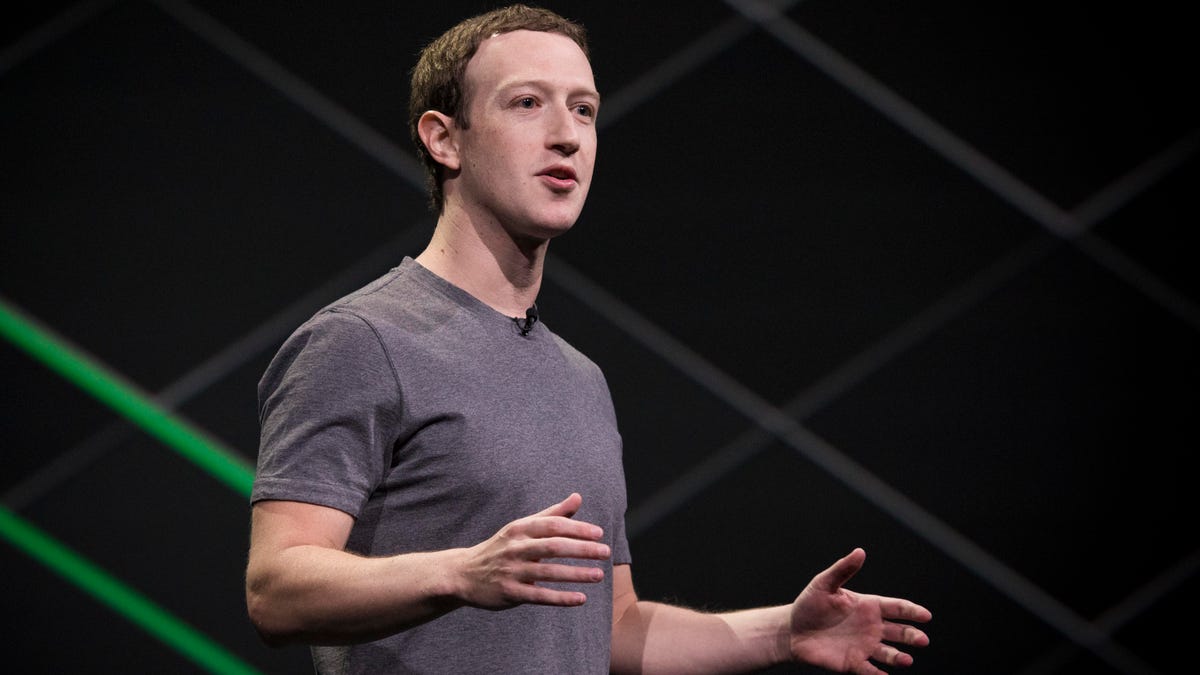Facebook to implement new transparency rules for political ads
In anticipation of the US midterm elections, the social network aims to make it explicitly clear when you're looking at a political ad.

Facebook CEO Mark Zuckerberg on Friday introduced new rules for advertisers aimed at transparency.
Facebook wants to make political advertisements easier to discern.
CEO Mark Zuckerberg on Friday introduced new rules for advertisers in an effort to promote transparency. Political ads will need to be verified and identified as political. A "paid for by" disclosure will be included and users can tap on an ad to view more information. To combat advertisers that do not disclose themselves, Facebook will use machine learning to help identify and verify them as political advertisers.
Zuckerberg also said Facebook is adding "thousands" of people to its teams that review ads.
"These changes will make it easier to see what different groups are trying to communicate around elections and will make it harder for anyone to break the rules," Zuckerberg wrote on his Facebook page. "This won't stop all bad actors, but it's one of many important steps forward."
The new policy comes days before Facebook, along with rivals Google and Twitter, are scheduled to testify in hearings with the Senate and House Intelligence Committees. On November 1, lawmakers will grill those tech giants on how Russian agents could have used their platforms to spread misinformation and meddle with last year's US presidential election.
The goal is to try to make sure Facebook isn't misused during US midterm elections next November. Zuckerberg said the new ad changes should go into effect by then. Twitter made similar changes earlier this week, announcing it will also publicly share the identity of political advertisers.
'Good for democracy'
In September, Zuckerberg said Facebook found $100,000 worth of ads purchased from Russian-linked accounts. The social network said the 3,000 ads were seen by 10 million Facebook users. When Zuckerberg disclosed the ads, he vowed to work for more "election integrity."
Weeks later, Twitter said it found 201 accounts that bought ads on its network that appear to be tied to those same Russian Facebook accounts.
Facebook's vice president of ads, Rob Goldberg, said on Friday one of the goals is more accountability.
"That level of transparency is good for democracy and it's good for the electoral process," Rob Goldman wrote in a separate blog post. "Transparency helps everyone, especially political watchdog groups and reporters, keep advertisers accountable for who they say they are and what they say to different groups."
Facebook will also allow users to view all ads circulating from a Page -- official Facebook pages for organization or brands -- even if that user is not part of the targeted audience for each ad. This rule will roll out next month and affect all Pages (not just political ones). Initial tests begin in Canada and users will initially be able to view current ads that are running from a Page. However, as this feature expands into the US during the election, Facebook will build an archive so users can view all federal election-related ads that have run in the past.
Facebook will also provide information on how much money political advertisers spent for each ad, the number of impressions the ad garnered and demographic information about the audience the ad reached.
After Facebook first announced the new ad rules, Democratic State Senator Todd Kaminsky of New York, who authored a bill demanding more transparency around political ads, said the archive didn't go far enough. "I am disappointed that Facebook's policy changes do not impact state and local elections," he said in a statement earlier today. "As the victim of malicious, false, and anonymous political advertising, I know that voters deserve information on who is targeting them so that they can properly evaluate the messages they receive."
But not everyone is happy about Facebook's new rules. New York State Senator Todd Kaminsky, who authored a bill demanding more transparency around political ads, said the change doesn't go far enough. That's because the archive doesn't apply to state or local ads.
"I am disappointed that Facebook's policy changes do not impact state and local elections," the Long Island Democrat said in a statement. "As the victim of malicious, false, and anonymous political advertising, I know that voters deserve information on who is targeting them so that they can properly evaluate the messages they receive."
In response, Facebook told CNET it's actively working on having the database include ads related to state and local elections in the US.
First published Oct. 27, 11:04 a.m. PT.
Update, 12:14 p.m.: Adds quotes from Zuckerberg's Facebook post and more background information.
Update, 1:06 p.m.: Adds comment from New York State Sen. Todd Kaminsky.
Update, 4:09 p.m.: Adds news of Facebook working to add local and state election ads to its archive.
The Smartest Stuff: Innovators are thinking up new ways to make you, and the things around you, smarter.
Special Reports: CNET's in-depth features in one place.



